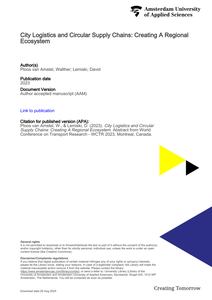Regenerative agriculture is increasingly seen as the way forward to safeguard soil fertility and with that economic, human and natural sustainability. The fashion industry, being very much reliant on inputs from the agricultural sector, can play a pivotal role in promoting regenerative practices. In order to do so however it needs to radically rethink its business model, or else it will not be able to reap all the possible benefits.
DOCUMENT

LINK
Implementing circular urban supply chains is a major economic transformation that can only work if significant coordination problems between the actors involved are solved. This requires, on the one hand, the implementation of efficient urban collection technologies, where process industries collaborate hand-in-hand with manufacturers and urban waste treatment specialists and are supported by digital solutions. On the other hand, it also requires implementing regional ecosystems connected by innovative CO2-neutral circular city logistics systems smoothly and sustainably managing the regional flow of resources and data, often at large-scale and with interfaces between industrial processes and private and public actors. Develop blueprint for circular urban region This research project aims to develop a blueprint for circular urban regions, including the demonstration of a territorial cross-sectorial, large-scale and sustainable systemic solution for the circularity of high-performance plastics from diverse applications of rigid polyurethane (PU) foams used as insulation material in refrigerators and construction elements. The research project develops a blueprint for regional participative governance using an approach involving multiple actors from the public-, private-, academic-, and financial sectors and civil society (by working in living labs).The focus of the presentation (and paper) is on the control tower elements of the circular urban supply chain and the elements to make the collaboration work.In terms of urban logistics and collection services is to make these materials accessible for downstream sorting and recycling processes for the first time in a sustainable and economically viable way. The project will develop a new way of processing defined waste streams like appliances (refrigerators), to separate chemically recyclable PU from a mixed plastics waste stream.
DOCUMENT

In Proceedings of the first CARPE conference november 2011
DOCUMENT

The Utrecht School of Journalism has a long tradition in international higher education. The School’s European Culture & European Journalism (ED&EJ) programme is an example of a pedagogical practice in higher education where advanced students learn how to perform in an international context. Journalism students from Moscow to Ottawa and from Helsinki to Bilbao learn alongside Dutch students. It is not only the content of the programme and the reporting for the Web Magazine that makes the EC&EJ programme an inspirational educational experience. The programme demonstrates the importance of sharing different professional and cultural values. This sharing and confronting of professional standards contributes to an important new qualification for all higher educated professionals: awareness of cultural differences and similarities
DOCUMENT

Het doel van dit interdisciplinaire SIA KIEM project Fluïde Eigenschap in de Creatieve Industrie is te onderzoeken of en hoe gedeelde vormen van eigenaarschap in de creatieve industrie kunnen bijdragen aan het creëren van een democratischer en duurzamer economie, waarin ook het MKB kan participeren in digitale innovatie. Het project geeft een overzicht van beschikbare vormen van (gedeeld) eigenaarschap, hun werking en hoe deze creatieve professionals kunnen ondersteunen bij de transitie naar de platformeconomie. Dit wordt toegepast op een concrete case, dat van een digitale breimachine. Naast het leveren van een goede praktijk, moet het project leiden tot een groter internationaal onderzoeksvoorstel over Fluid Ownership in the Creative Industry, dat dieper ingaat op de beschikbare eigendomsoplossingen en hoe deze waarde zullen creëren voor de creatieve professional.